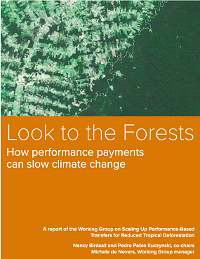
Reducing deforestation is an urgent, affordable, and feasible solution to reducing greenhouse gas (GHG) emissions in the short term. And forests provide development benefits beyond their role in climate mitigation such as livelihoods for indigenous and local communities and maintaining hydrological systems and rainfall patterns. Yet despite these multiple benefits and the urgency to find affordable solutions to curb greenhouse gas emissions, international funding to reduce deforestation has been limited by fiscal, political, and technical challenges. The Working Group on Performance-based Payments to Reduce Tropical Deforestation considered ways to mobilize additional funding from high-income countries to reduce deforestation in tropical forests and to shift the composition of the funding to pay tropical forest countries for actual results.
To date, most international funding to reduce deforestation has concentrated on the important work of capacity building and policy reform. Additional funding for performance-based payments to slow deforestation can provide governments the economic incentive needed to help withstand pressures to convert forest lands to other uses, and can enable global climate targets to be more ambitious, more cost-effective, and more rapid than would otherwise be the case.
Chaired by CGD President Nancy Birdsall and former Prime Minister of Peru, Pedro Pablo Kuczynski, and managed by CGD senior associate Michele de Nevers, the Working Group assessed the factors inhibiting the expansion of international funding for performance-based approaches to reduce deforestation, analyzed progress in existing programs and identified solutions to current barriers.
CGD is grateful for contributions from the Norwegian Agency for Development Cooperation in support of this work.
Working Group Members
- Arild Angelsen, Professor, UMB School of Economics, Norwegian Univ. of Life Sciences
- Owen Barder, Senior Fellow/Director for Europe, Center for Global Development
- Jonah Busch, Research Fellow, Center for Global Development
- Andreas Dahl-Jørgensen, Climate Advisers
- Robin Davies, Associate Director, Development Policy Centre, Australia National University
- Christine Dragisic, US Department of State, Office of Global Change
- Gwen Hines, Executive Director, World Bank, United Kingdom
- Kevin Hogan, UN Advisor to Mary Robinson, Special Envoy on Climate Change
- Ingrid Hoven, Ministry for Economic Cooperation and Development, Germany
- Bharrat Jagdeo, Former President of Guyana
- Harrison S. Karnwea, Managing Director, Forestry Development Authority of Liberia
- Benjamin Knoedler, Advisor to Executive Director, World Bank, Germany
- Carlos Klink, National Secretary for Climate Change and Environmental Quality of Brazil
- Rezal Kusumaatmadja, Co-founder, Starling Resource and COO, PT Rimba Makmur Utama
- Gavin Neath, Senior VP Sustainability, Unilever
- Per Pharo, Director, Government of Norway’s International Climate and Forest Initiative
- Andrew Preston, Development Counselor, British Embassy
- Nigel Purvis, Founder/President/CEO, Climate Advisers
- Artur Runge-Metzger, Director, International and Climate Strategy, DG Climate Action
- Juliana Queiroz Santiago, Environmental Division, Head of Amazon Fund Department, BNDES
- Bill Savedoff, Senior Fellow, Center for Global Development
- Frances Seymour, Senior Fellow, Center for Global Development
- Dorte Verner, Principal Specialist, IDB
- Michael Wolosin, Climate Advisers





